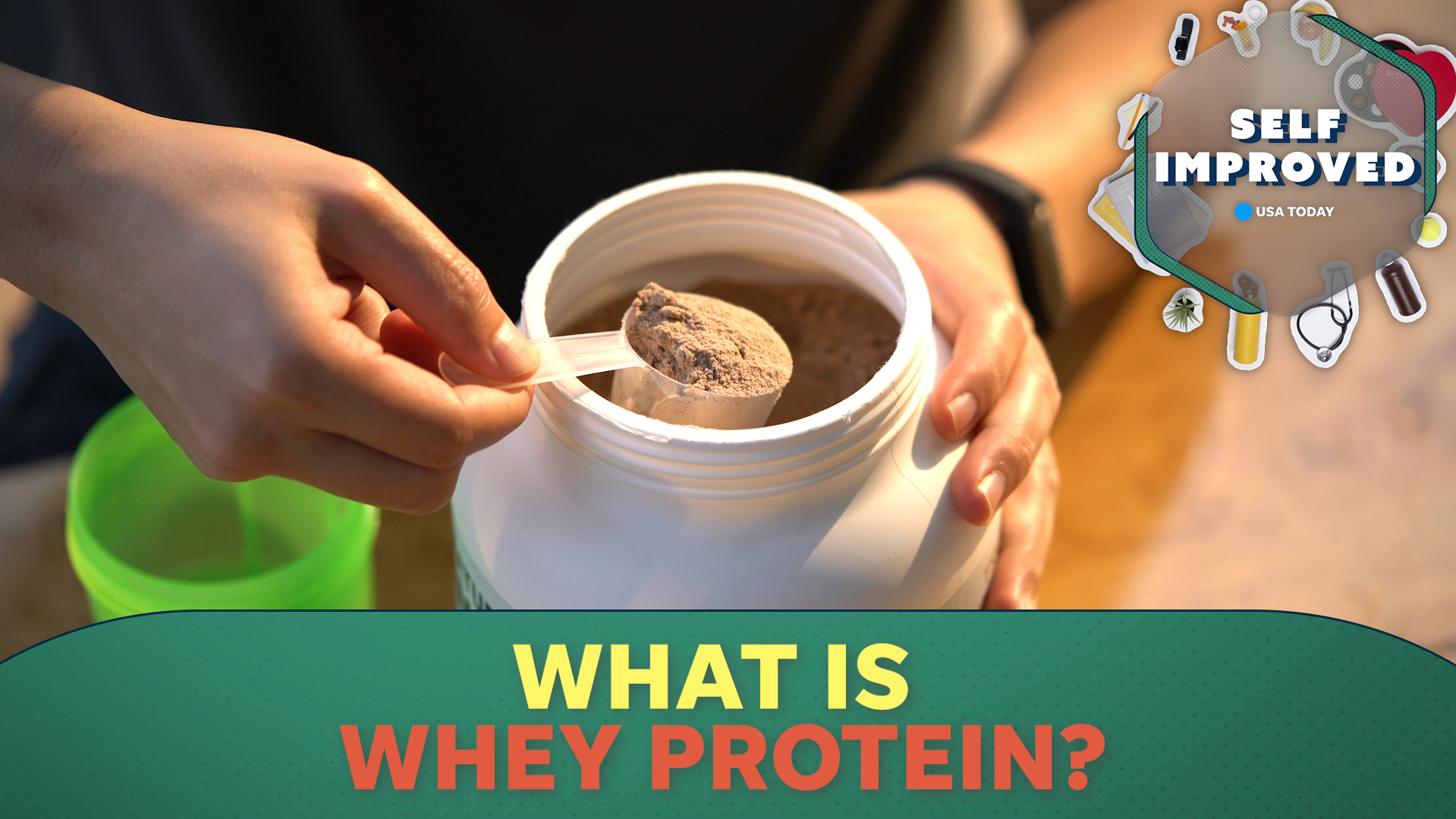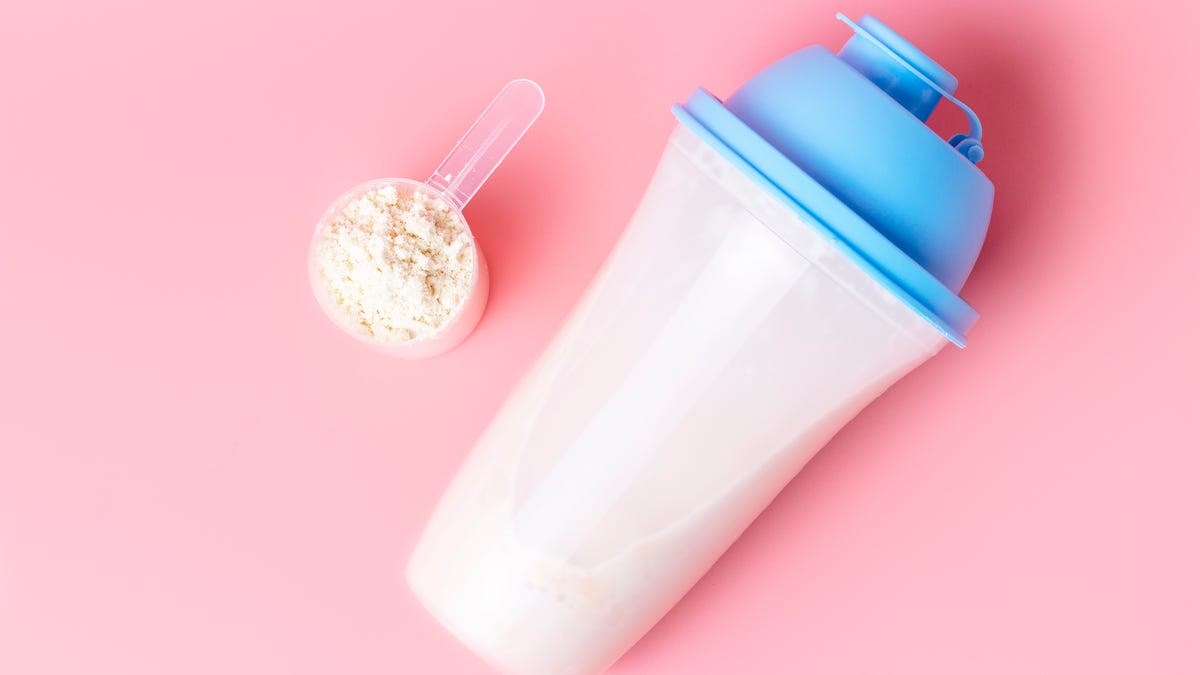
A dietician explains how whey protein works
Whey protein is a popular supplement but how safe is it for you? Registered dietician Abbey Sharp explains.
Some protein powders and shakes are riddled with high levels of lead, a Consumer Reports investigation has found.
The organization purchased multiple samples of protein products over a three-month period starting in November 2024 and analyzed their lead levels.
Test results revealed that more than two-thirds of the analyzed products contained more lead than the report’s food safety experts consider safe to consume in a day, with some exceeding the limit by more than 10 times.
According to the organization, two plant-based protein powders contained enough lead that experts interviewed by Consumer Reports advised against ingesting them.
What products were tested?
Here’s a list of all the products tested by Consumer Reports, their serving sizes, and what they were categorized in the investigation:
Naked Nutrition Vegan Mass Gainer (Serving size: 315 grams, which is six scoops)Listed as: Products to avoidHuel Black Edition (Serving size: 90 grams, which is two scoops)Listed as: Products to avoidGarden of Life Sport-Organic Plant-Based Protein (Serving size: 45 grams, which is two scoops)Listed as: Recommend limiting to once a weekMomentous 100% Plant Protein (Serving size: 37.7 grams, which is one scoop)Listed as: Recommend limiting to once a weekMuscleMeds Carnivor Mass (Serving size: 191 grams, which is four scoops)Listed as: Okay to eat occasionallyOptimum Nutrition Serious Mass (Serving size: 340 grams, which is two scoops)Listed as: Okay to eat occasionallyJocko Fuel Mölk Protein Shake (Serving size: 355 ml, which is one carton)Listed as: Okay to eat occasionallyVega Premium Sport Plant-Based Protein (Serving size: 44 grams, which is one scoop)Listed as: Okay to eat occasionallyQuest Protein Shake (Serving size: 325 ml, which is one carton)Listed as: Okay to eat occasionallyOrgain Organic Plant-Based Protein Powder (Serving size: 46 grams, which is two scoops)Listed as: Okay to eat occasionallyOptimum Nutrition Gold Standard Protein Shake (Serving size: 325 ml, which is one carton)Listed as: Okay to eat occasionallyEquip Foods Prime Protein (Serving size: 25.7 grams, which is one scoop)Listed as: Okay to eat occasionallyPlantFusion Complete Protein (Serving size: 30 grams, which is one scoop)Listed as: Okay to eat occasionallyEnsure Plant-Based Protein Nutrition Shake (Serving size: 330 ml, which is one carton)Listed as: Okay to eat occasionallyMuscle Milk Pro Advanced Nutrition Protein Shake (Serving size: 330 ml, which is one carton)Listed as: Okay to eat occasionallyKOS Organic Superfood Plant Protein (Serving size: 37 grams, which is two scoops)Listed as: Okay to eat occasionallyOwyn Pro Elite High Protein Shake (Serving size: 330 ml, which is one carton)Listed as: Better choices for daily consumptionTransparent Labs Mass Gainer (Serving size: 194 grams, which is two scoops)Listed as: Better choices for daily consumptionOptimum Nutrition Gold Standard 100% Whey (Serving size: 30.5 grams, which is one scoop)Listed as: Better choices for daily consumptionBSN Syntha-6 Protein Powder (Serving size: 47 grams, which is one scoop)Listed as: Better choices for daily consumptionMomentous Whey Protein Isolate (Serving size: 26.5 grams, which is one scoop)Listed as: Better choices for daily consumptionDymatize Super Mass Gainer (Serving size: 333 grams, which is two and a half scoops)Listed as: Better choices for daily consumptionMuscle Tech 100% Mass Gainer (Serving size: 357 grams, which is six scoops)Listed as: Better choices for daily consumptionWhat exactly did the Consumer Reports investigation find?
Naked Nutrition’s Mass Gainer powder contained 7.7 micrograms of lead per serving, roughly 1,570% of the organization’s level of concern for the heavy metal. Similarly, one serving of Huel’s Black Edition powder contained 6.3 micrograms of lead, which is about 1,290% of the daily lead limit cited by the organization.
Additionally, two other powders contained lead between 400 and 600% of CR’s levels of concern: Garden of Life’s Sport Organic Plant-Based Protein and Momentous’ 100% Plant Protein. One of the organization’s experts said consumers should limit these powders to once a week.
One non-plant-based protein powder with lead detected at over 200% of the organization’s level of concern was MuscleMeds’ Carnivor Mass powder. One beef powder, six additional plant-based powders, five dairy-based powders, and shakes contained lead above Consumer Reports’ level of concern.
One serving of Huel’s Black Edition plant-based protein powder contained 9.2 micrograms of cadmium, which is over double the level that experts say people should ingest on a daily basis, which is 4.1 micrograms.
Vega’s Premium Sport powder was also tested by the organization, and the results found that the level of cadmium in the product was enough to be over the acceptable level. Optimum Nutrition’s Serious Mass whey protein powder also had 8.5 micrograms per serving of inorganic arsenic. That number is twice the limit of what experts say is safe to consume, the organization said.
Companies respond to Consumer Reports findings
USA TODAY contacted Naked Nutrition, PlantFusion, BSN, KOS, Owyn, Dymatize, Muscle Tech, Muscle Milk, Ensure, Transparent Labs, Quest, Orgain, Equip Foods, Jocko Fuel, Vega Premium Sport, Optimum Nutrition, Huel, Garden of Life, Ensure, Momentous and MuscleMeds for statements.
A spokesperson for Huel said the company is extremely frustrated by this report, which it believes is alarmist. The company’s remarks stated the article is based on California’s Proposition 65, which uses a threshold of 0.5 micrograms of lead per day.”It is important to understand that the Consumer Reports approach reflects a uniquely cautious regulation rather than an internationally accepted measure of consumer safety,” the company said.
A spokesperson for Momentous said the products tested as part of the Consumer Reports investigation are no longer available for purchase and were fully discontinued across all channels in March.
How dangerous is it to consume lead?
Rose Goldman, MD, an associate professor of medicine and physician at Cambridge Health Alliance, told the organization that while no amount of lead is technically safe, the real risk derives from continuous intake or exposure to high doses of toxins. Pregnant people and children are most at risk because the toxins can cause neurological issues, learning delays, and behavioral problems, the organization reported.
What’s more is that chronic lead exposure has also been linked to immune suppression, reproductive problems, kidney damage and high blood pressure in adults.
The recommended dietary allowance for protein is 0.8 grams per kilogram of body weight, or 0.36 grams per pound, according to Harvard Health. The amount is what you need to meet your basic nutritional requirements, or the amount needed to keep from getting sick, per university research.
Good sources of protein include: tuna, salmon, haddock, trout, turkey, chicken, Greek yogurt and beans, among others.
How does lead end up in food?
It’s almost impossible to avoid lead from ending up in food due to farming conditions, according to Consumer Reports. Heavy metal contamination can come from natural sources because lead is found in the earth’s crust.
Moreover, industrial farming contributes to pollution, wastewater irrigation or road dust that may cause toxins to end up in foods as plants absorb what is around them. As an example, metals can end up in milk through a cow’s consumption of feed and water.
What should consumers do?
Experts who spoke to Consumer Reports said that consumers who are concerned about their protein intake should limit exposure, check whether the test results for specific products are online prior to making a purchase, and consume foods with high levels of protein instead of protein powder or products.
This story has been updated to add new information.
Michelle Del Rey is a trending news reporter at USA TODAY. Reach her at mdelrey@usatoday.com

